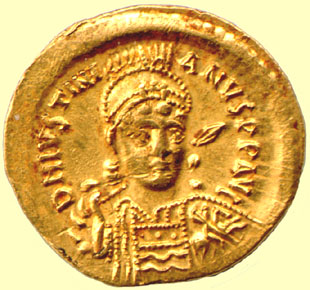 Contents -
Previous Article
Contents -
Previous Article
Justinian was the last great Roman emperor. The Western Roman Empire was a thing of the past, its former glories swallowed up by small Germanic kingdoms in Italy that were continually being reconquered by the Eastern empire and again gaining their independence throughout the Sixth Century A. D.
Justinian was known as a strong ruler and an excellent administrator. One of his most valuable contributions to modern society was his code of Roman law. He had the best legal scholars of the empire take all the Roman laws on the books from the time of Augustus and condense them into a uniform code of laws in which all the inconsistencies had been ironed out. Justinian also pursued an ambitious dream of restoring the old Roman Empire, regaining the Western and North African provinces lost to the Goths, Vandals, and Franks during the Fifth Century. Justinian's brilliant and loyal general Belisarius was entrusted with this task but when Belisarius began to show an unbroken record of success in his hard-fought military campaigns, Justinian began to grow jealous of his top general's popularity. Though historians still argue whether it was due to this jealousy or the fact that the imperial treasury was nearly empty at the time, Justinian failed to send needed reinforcements for the final military campaign to retake Italy from the Ostrogoths. The ensuing warfare and the fact that Italian cities were continuously changing hands during the period from A. D. 535 - 539 did more to destroy the fine aqueducts, buildings, and other architectural masterpieces of the ancient Romans than any series of events before or since that time. Many regions of Italy lay in ruins and their inhabitants subsisted in poverty for many centuries after this mighty tragedy. If Justinian had left Italy to the Ostrogoths or had supplied the means to win the campaign quickly, much of the rich architectural heritage of the ancient Romans would be ours to enjoy today.
Justinian taxed the people heavily to pay for his wars abroad and to finance the construction of magnificent buildings in Constantinople. Fires started during the Nika Revolt destroyed much of the city in A. D. 532, giving Justinian an excuse to spend even more money to rebuild the devastated structures in much greater splendor than the original ones they replaced.
Justinian made efforts to collect taxes that were already on the books, but that people had been finding ways to evade by bribing government officials and finding loopholes in the existing laws. Many people lost their fortunes when back taxes were calculated and collected. Justinian's Praetorian Prefect, John of Cappadocia, was known as a particularly efficient and ruthless tax collector and enforcer.
Justinian's highly intelligent and thoroughly capable wife, the empress Theodora assisted him in governing his vast and prosperous empire. In fact, it was her courage that saved his throne and possibly his life during the desperate days of the Nika revolts. When Justinian’s generals and court advisors were telling him to board a swift warship they had prepared for him and flee to the relative safety of the city of Heraclea, Theodora urged him to stay and fight. "If you wish safety, My Lord... there is the sea and yonder your ships. But as for me, I prefer the old saying that the purple is the noblest shroud." The purple she refers to, of course, is the purple color of the robes worn only by royalty.
Go back to previous article on Justin I